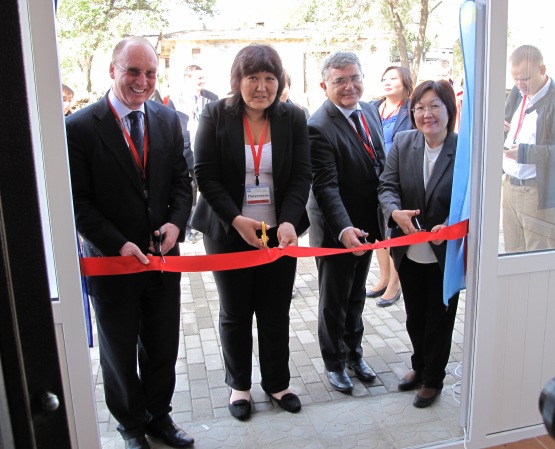Opening of the newly renovated Animal Breeding Facility at KSCQZD in Kazakhstan

On 2 October, the ISTC Executive Director Mr. David Cleave, together with the Deputy Head of the EU Delegation to Kazakhstan, Mr. Kamen Velichkov and Dr. Zuresh Zhumadilova, Chief Expert of the Committee on Consumer Protection of Kazakhstan, opened the newly renovated animal breeding facility at the Kazakh Scientific Centre for Quarantine and Zoonotic Diseases (KSCQZD). The facility was renovated by the European Union under an ISTC Project denominated “Renovation of the Animal breeding facility of KSCQZD in accordance to International Animal Regulations”. The project is part of a larger EU-ISTC agreement with the objective of strengthening Biosafety & Biosecurity capabilities in Central Asian Countries. Activities under the Project started in February 2013 with a budget of $2,400,000 USD (~ 1,800,000 EUR).
Use of laboratory animals is an integral part in many biomedical studies and, so far, for many research problems there are still no alternatives available to using animal models. For example, laboratory animals are still used in diagnosis of (highly) dangerous infectious diseases, production of bio-immune preparations and pharmaceuticals, and toxicology studies of newly developed chemical compounds. However, utilization of laboratory animals in the international scientific community is regulated by international standards, which are based on the principles of what is referred to as the “three R Concept” (W.M.S Russell and R.L. Burch, 1959) - Replacement, Reduction and Refinement. The aim of this concept is to minimize the use of animals (Replacement of animal models with non-animal methods if possible, and if not, Reduction of animals by choosing proper animal models in proper developed experiments) and to alleviate or minimize their suffering (minimization of potential pain, suffering and distress, and improvement of animal welfare).
To perform studies with animal models according to international standards one key requirement is to have animals of high and reproducible quality. In order to produce such animals, KSCQZD staff was trained in international animal care and use standards and norms and the KSCQZD animal breeding facility was renovated according to international standards. KSCQZD is the premier infectious disease research institute in Central Asia.

